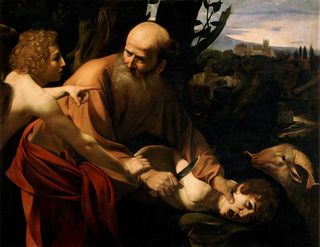Relationships
What Is Love?
Love is a word with many meanings. But do they all have something in common?
Posted April 28, 2020 Reviewed by Kaja Perina

Love is a word with a meaning that has changed over time.
Today, we tend to think about love primarily in terms of romantic love.
But, if you consider it, the concept of romantic love barely features among the 66 books of the Bible. The two greatest "love" stories in the Bible are not of husband and wife, nor even of man and woman, but of man and man, and woman and woman: David and Jonathan, and Ruth and Naomi.
Instead, all love in the Bible is directed at God, and the love for the spouse, and more generally for the other, is subsumed under the love of God.
In the Sacrifice of Isaac (pictured), Abraham’s love for God trumps his love for his own son Isaac, whom he is willing to sacrifice for no other reason than that God commanded it.
In Ancient and medieval times, people did of course fall in love, but they did not believe that their love might in some sense save them, as we tend to today. When, in Homer’s Iliad, Helen eloped with Paris, setting off the Trojan War, neither she nor he conceived of their attraction as pure or noble or exalting.
Over the centuries, the sacred seeped out of God and into romantic love, which came to take the place of the waning religion in lending purpose to our lives. People had once loved God, but now they loved love: more than with their beloved, they fell in love with love itself.
Abraham had surrendered himself and Isaac out of love for God. But in the Romantic era, around the time of the American and French Revolutions, love grew into all the opposite: a means of finding and validating oneself, of lending weight and texture and solidity to one’s life—as encapsulated by Sylvester’s 1978 hit, You Make Me Feel (Mighty Real), the final kissing scene in Cinema Paradiso, and countless other popular songs and films.
In the time of God, "finding oneself"—or, more accurately, losing oneself in God—had demanded years of patient spiritual practice. But after the French Revolution, romantic love could come to the rescue of almost anyone, with very little effort or sacrifice on their part.
Being saved became simply a matter of luck.
If love is a word with a meaning that has changed over time, it is also a word with several meanings, one that points at a diversity of distinct concepts with only a family resemblance between them.
Unlike us, the Ancient Greeks had several words for love, enabling them to distinguish more clearly between the different types. Eros, for example, referred to sexual or passionate love; philia to friendship; storge to familial love; and agape to universal love, such as the love for strangers, nature, or God.
As I show in my new book, The Secret to Everything, having more words for "love" enables us to think and talk about love in new and different ways. For instance, people in the early stages of a romantic relationship often expect unconditional storge, but find only the need and dependency of eros, and, if they are lucky, the maturity and fertility of philia. Given enough time, eros tends to mutate into storge.
But if we are to understand the deep meaning of the word "love", then we need to uncover what all these different types of love share in common. In other words, what is it that unites eros, philia, storge, and agape?
What all these instances of love have in common, I think, is a reaching out beyond our own being to things that are able to lend weight and meaning to our lives, and, at the same time, an incorporation of those things into our inner being—whence the hug, the love bite, and the sacramental bread and wine of the Eucharist.
Love is the force of nature that enables us to cross the boundary between ourselves and the world, like the lobster, to shed our shell and grow beyond it—which is why people with little love are so small.


